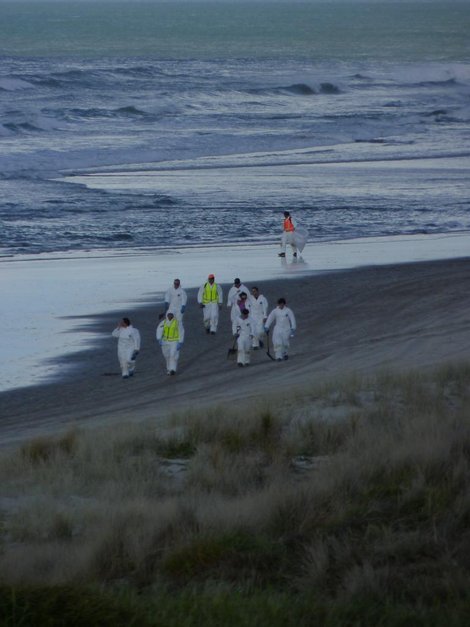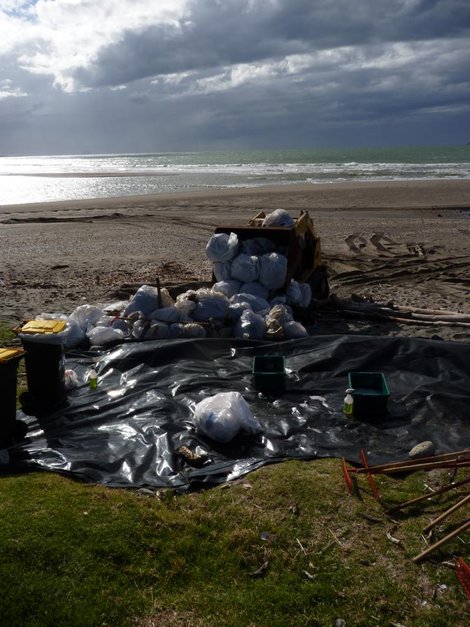Die Inhalte dieser Seite sind leider nicht auf Deutsch verfügbar.
Seitenpfad:
- INTERCOAST
- Latest News
- Archiv
- News 2011
- Operation Beach Clean: Ethnographic fieldwork, hands-on
Operation Beach Clean: Ethnographic fieldwork, hands-on
In the first week of October, and after one year of ethnographic fieldwork, my research stay in the Bay of Plenty had almost come to its scheduled end. I had arranged a number of farewell meetings and last interview appointments with contacts from BOP Coast Care, BOP Regional Council, the Port of Tauranga, Te Runanga O Ngai Te Rangi Iwi Trust and the Matakana Island Community Nursery. Little did I know that these people would only days later find themselves in the middle of escalating events when the containership MV Rena hit the Astrolabe reef out of Tauranga Harbour early on October 5th 2011.
Already on my way back to Bremen, I returned to Aotearoa from Australia on October 13th when the scale of the incident had become evident – the scale of the pollution, but also the scale of the volunteer response so typical for the New Zealand situation. Drawing on field contacts established during my fieldwork on so-called soft coastal hazard protection, especially Coast Care, I had the possibility to start my action research of participating in the oil spill clean-up immediately on arrival back in the Bay.
Already on my way back to Bremen, I returned to Aotearoa from Australia on October 13th when the scale of the incident had become evident – the scale of the pollution, but also the scale of the volunteer response so typical for the New Zealand situation. Drawing on field contacts established during my fieldwork on so-called soft coastal hazard protection, especially Coast Care, I had the possibility to start my action research of participating in the oil spill clean-up immediately on arrival back in the Bay.

After the authorities had been overwhelmed by people trying to help out with cleaning up the beaches, the responsible Maritime New Zealand Incident Command Centre (ICC) had set up a volunteer response programme where people had to register online and wait to be contacted for training and deployment. During the first days of Operation Beach Clean, many more people wanted to help than could be accommodated in terms of equipment, training and supervision.
But outside the suburban centres of Papamoa and Mount Maunganui, locals took matters into their own hands. Iwi representatives had early been in contact with Maritime NZ, requesting supervisor training and equipment and establishing a second tier of volunteer response. In Maketu east of Tauranga, the volunteer response was (and continues to be) organized through Whakaue Marae.
Here, I took part in clean-up efforts along the sand spit and the rocky foreshore. While being tedious as well, picking up oil from a sandy beach seems relatively easy if compared to the removal of oil from the rocks. The blobs of sticky, tar-like oil are very difficult to remove, and we used an absorbent moss product to ease the process of rubbing off the oil. We were wearing protective gear – suits, gumboots and several layers of gloves – but that did not provide protection against rain, burning sun and the ever-present smell of toxic oil.
In these early days, the clean-up was exclusively accomplished with manual labour. Only some weeks later, new techniques like sifting, surf washing and the use of beach-grooming vehicles were introduced (on sandy beaches). New oil was continuously arriving on the beaches and no end of the operation was in sight. But this was still Aotearoa New Zealand! The optimism and hand-on attitude of the people involved was amazing. Old and new Maketu locals, inland Te Arawa hapu from Rotorua, overseas tourists, NZ Armed Forces, and people arriving from all over New Zealand: all together we exemplified that in the Aotearoa New Zealand context, working with nature – actual physical labour – is a common form of expressing caring for nature.
Reported by Friederike Gesing
Links:
Maritime NZ
BOP Volunteer Hub



